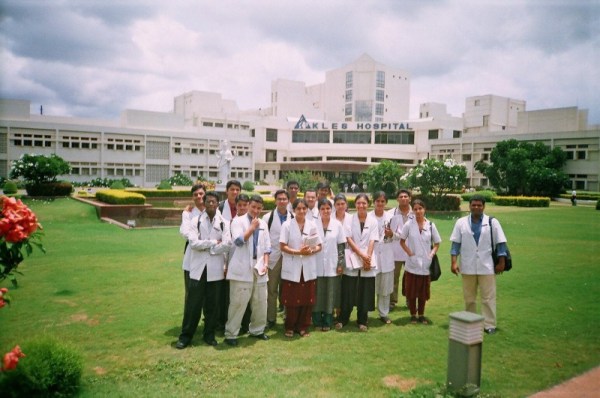The blue-eyed boy, Dr. Sunil D. Shenvi (MBBS, MS, MCh, FASTS, LLB), Senior Hepato-Biliary & Pancreatic/Multiorgan Transplant Surgeon at BGS Gleneagles Global Hospital, Bengaluru is the pride of Belagavi.
Brought up & educated at Belagavi, Dr. Shenvi is a multi-faceted personality. He did his schooling in Kannada from Sharman School and Swadhyaya Vidya Mandir, Tilakwadi, PUC from GSS College and went on to do his MBBS from prestigious KLES J N Medical College. He did his post-Graduation in General Surgery & Post-doctoral (M. Ch) in Surgical Gastroenterology and HPB Surgery from the Postgraduate Institute of Medical Education and Research, Chandigarh. Then he honed his skills in Liver and Multiorgan Transplantation at the University of Minnesota and Medical University of South Carolina, USA.
To date, he has been an integral part of over 450-500 Liver, Pancreas and Multiorgan Transplant surgeries. Dr. Shenvi’s incredible success story is an inspiration to hundreds of young people from a small city like Belagavi, who aspire to make it big in their lives.
In the candid interview with All About Belgaum, he shared all the aspects of Liver Transplant and has enlightened the medical fraternity in particular & the public at large on all the facets of Liver Transplant which is most complex, difficult and challenging of all the organ transplantation.

Which gender has more prevalence of liver disease?
Dr. Sunil: Liver disease is more common in males. Of late, the difference between the two genders is getting narrower. Even children are victims of liver disease and few of them are advised liver transplants.
What is the age group that usually undergo transplants?
Dr. Sunil: It is the most productive age group bracket of 40-50 years who undergo liver transplantation. We have even performed a liver transplant on patients of the 60-65 years age group.
What is longevity after a liver transplant?
Dr. Sunil: Liver transplant is a high-risk supra major surgery. Approximately, 95 percent of transplant recipients survive one year after surgery. Once they tide over 1st year of post-transplant, normally, they live like any other person. 1st year is very crucial after a liver transplant. Our multi-disciplinary team ensures good care post-transplant and follows them regularly. Even if there are minor complications, we anticipate them early & effectively manage them. A liver transplant can have excellent outcomes. Recipients have been known to live a normal life for over 25-30 years after transplant.
Post liver transplant, how many days of hospital stay is required?
Dr. Sunil: Usually, it is 2-3 weeks. At the end of two weeks, we discharge most of the patients. But we do a regular follow-up of them.
What are the post-transplant complications?
Dr. Sunil: We discuss the entire gamut of liver transplantation benefits & possible complications with the patient and family members before we register the patient for liver transplant. Even the smallest of the details are explained which include, postsurgical complications, infection, pre-transplant investigations, registration for Transplantation, the likely waiting period in case of a deceased donor, cost, treatment after transplant, etc. We take the patient and their family members into confidence and on their voluntary consent only, we go ahead and prepare patients for transplant. As it is a supra major surgery, post-transplant complications are almost 20-30%. Patients who register for transplants are in an advanced stage of disease and it is not just the liver; they have heart & kidney problems, anemia, uncontrolled diabetes & accelerated hypertension, which also need to be treated. The patient may have other co-morbid conditions. Our multi-disciplinary team has the expertise and experience to anticipate and manage complications. The most common and most clinically significant complications are arterial and venous thrombosis and stenosis, biliary disorders, fluid collections, neoplasms, and graft rejection. Our team of highly skilled Surgeons, Physicians, Intensivists, Transplant Nurses and other staff work in tandem & overcome most of the challenges.
How challenging is Liver Transplant compared to other organ transplants?
Dr. Sunil: Of all the organ transplantations, definitely, liver transplant is the most complex, demanding, and challenging.
“Alcoholic liver disease is on the rise and is the main culprit for liver damage. Hepatitis B & Hepatitis C also cause damage to the liver. Liver trauma is the remotest indication for liver transplantation. Of late, Fatty Liver is also causing damage to liver through liver cirrhosis and requires a liver transplant. To avoid end-stage liver disease, we need to screen people at risk for liver parameters and undergo regular health check-ups”:
Dr. Sunil Shenvi.
Living donor v/s cadaver donor
Dr. Sunil: In the case of a living donor, we make a healthy person donate a part of the liver through surgery. We are forced to harvest liver from a healthy donor, as the waiting list in case of cadaver donation is long. Patients awaiting a liver may not sustain for that long and may succumb to death. Of late, things are promising as more and more deceased donations are happening, which is a welcoming change. Results are similar to living or cadaver donations.
How much liver do you harvest from a living donor for transplant?
Dr. Sunil: In the case of a living donor, at least 30%-40% of the liver has to be left with the donor and 60-70% of the liver can be taken out. It also depends on the age, the weight of the recipient and other medical parameters. In the case of the pediatric age group, 20%-30% of the liver will suffice the requirements. Once we take 60% liver from the recipient, the beauty of the liver is, it grows back within 6-8 weeks.
What are the chances of post-transplant infections/rejections?
Dr. Sunil: The majority of the liver patients are very sick; their bodies are not strong. They are prone to infection. We know they are at risk of infections. We organize total isolation, barrier nursing, and infection control measures. We take extreme care and never compromise on precautions.
Close monitoring after discharge
Dr. Sunil: We ensure regular follow-up of patients and closely monitor all parameters. We give sufficient time, careful attention to medication schedules, lifestyle changes, infection-avoidance techniques — all these are important ways to prolong one’s life after transplantation. Most patients can return to work within 6 months after a transplant. We encourage them to do light exercise, socializing, and travel for pleasure. Our objective is to make a person fit and get back to his/her normal routine.
Medication after discharge
Dr. Sunil: As the patient heals and recovers with the help of their new liver, dosages and number of medications are reduced over time. By six months, it is common to be down to 1 or 2 medications. However, patients will be taking immunosuppression medications for the rest of their lives in virtually all cases. For the first year post-transplant, it is usually Rs. 8,000/- to Rs. 10,000 expenses/month. After a year, it is just 1-2 medications which may cost Rs. 2,000- Rs. 3,000/-
Your team consists of which all specialties?
Dr. Sunil: Our passionate liver transplant team consists of Liver Surgeons, Physicians, Medical Gastroenterologist, Nephrologists, Intensivist, Transplant Nurses & Support staff. It is a huge professional team of 25-30 experts.
In his final chat, Dr. Sunil shared his love for the refreshing climate of Belagavi, drizzling, cool breeze, greenery around the city, Kannada-Marathi-Konkani culture, and mouthwatering North Karnataka food. He has recently completed his degree in law (LLB) from Karnataka State Law University, Hubballi and he is well versed with medicolegal issues in clinical practice.

Deeply attached to his roots, Dr. Shenvi was once fascinated to explore farming as a career. He was a member of ‘Ranga Sampada’, an amateur theater art. Every month, he makes it a point to visit Belagavi and his favorite spot is his alma mater, J N Medical College. He wishes like Kidney & Heart, the Liver transplant program would soon take off at KLES Dr. Prabhakar Kore Hospital and Medical Research Centre, which has excellent infrastructure and all the facilities & expertise for liver transplantation. The needy liver patients need not travel to far-off places like Bengaluru, Chennai or Mumbai.

His Parents, Mr. Dayanand Shenvi and Mrs. Vanita Shenvi, his brother Dr. Suresh Shenvi, his sister-in-law Dr.Pankhuri Shenvi stay in Tilakwadi Belagavi. He is married to Dr. Pratiksha Shenvi, who is a Consulting Pathologist at Medall Clumax Lab, Bengaluru. He is blessed with two daughters, Sanskriti and Swara. Recognizing Dr.Sunil Shenvi’s immense contribution in the field of GI, HPB and Transplant Surgery in India; he has been chosen as a Fellow of the American College of Surgeons recently and it will be awarded during the upcoming Annual Conference in the month of October 2021.
Dr.Sunil Shenvi MS (General surgery), M.Ch (GI & HPB Surgery), ASTS Transplant Fellowship, LLB (Karnataka State Law University)(Ex) Clinical Assistant Professor, Medical University of South Carolina, USA Consultant, BGS Gleneagles Global Center of Excellence for Liver & Pancreatic Disorders and Multiorgan Transplantation, Bengaluru,India Cell phone: +91 9538537228 Email :[email protected], [email protected], [email protected]




Liver transplantation restores a better quality of life and helps patients in living healthy. This is very information article. Good read!